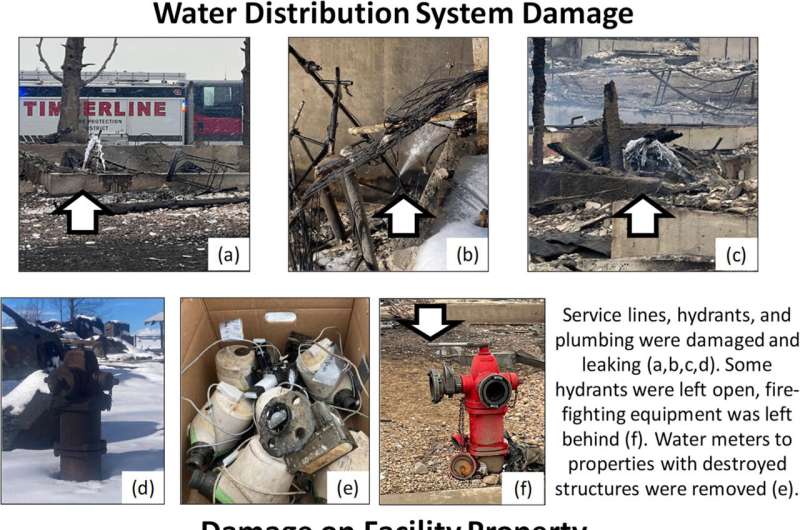This article has been reviewed according to Science X's editorial process and policies. Editors have highlighted the following attributes while ensuring the content's credibility:
fact-checked
trusted source
proofread
Study: How to apply lessons from Colorado's costliest wildfire to drinking water systems

Wildfire damage to drinking water systems can significantly delay a community's economic recovery. The costliest disaster in Colorado's history, the Marshall Fire of 2021, resulted in more than $2 billion in losses. Six drinking water systems were directly in the fire's path.
While communities and governments nationwide have been facing the impact of these disasters on drinking water systems, no national synthesis of scientific and policy needs has been conducted. Now, a study has outlined the scientific and policy needs specific to drinking water systems' resilience to wildfires.
At the request of two Colorado cities shortly following the Marshall Fire, Purdue University researchers provided onsite technical assistance and led the case study. The goal was to better understand the decisions, resources, expertise and response limitations during and after the wildfire. The team also included collaborators from the University of Colorado Boulder, Oregon State University and Corona Environmental Consulting LLC.
The researchers say that should the needs identified by this study be addressed, drinking water safety risks could be minimized, and wildfire-vulnerable communities could better protect their workers and the overall population and expedite recovery.
Andrew Whelton, the first author of the study, is a professor in Purdue's Lyles School of Civil Engineering and Division of Environmental and Ecological Engineering. He also directs the Healthy Plumbing Consortium and Center for Plumbing Safety. His research group specializes in disaster response and recovery when critical infrastructure systems are impacted.
Purdue researchers were called for help and teamed up with multiple organizations that were impacted by, and responded to, the Marshall Fire. To conduct this case study, the team met with utility staff, visited the areas impacted, inspected damaged systems and customer properties, and assisted with developing drinking water infrastructure damage and contamination assessment strategies.
Insights from the Boulder County Health Department, Colorado Department of Public Health and Environment, U.S. Environmental Protection Agency Regions 8 and 9 and community members were also reviewed. The team reviewed water sampling and testing records, public announcements and meeting recordings.
The study is published in AWWA Water Science.
More information: Andrew J. Whelton et al, The Marshall Fire: Scientific and policy needs for water system disaster response, AWWA Water Science (2023). DOI: 10.1002/aws2.1318
Provided by Purdue University



















